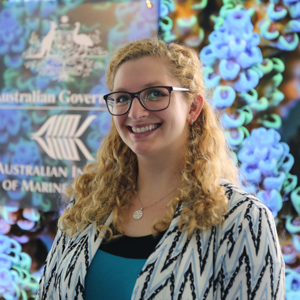Dr Randall’s marine science career began in the Caribbean, working on the sexual reproduction of corals, and evaluating the impact of warming oceans on the early life-history stages of corals. She then went to work with the U.S. Environmental Protection Agency’s coral reef task, to evaluate the impact of sedimentation from land-use change on coral reproduction and recruitment. Later she returned to academia to investigate the impacts of coral-disease outbreaks on coral populations in the Caribbean. During this time, diseases were becoming a major challenge for reefs in the region, and Dr Randall applied spatial-ecological modelling approaches to test questions of disease causation and transmission, by identifying environmental drivers.
The need for effective and large-scale coral restoration became increasingly obvious during her years working in the Caribbean, which led her to pursue a career at the Australian Institute of Marine Science that combines developmental biology, marine ecology, & restoration science. Dr Randall’s current research focuses on overcoming the settlement and post-settlement survival bottlenecks in the early life-history stages of corals for use in reef-restoration activities. She investigates coral larval-settlement cues, and combines large spatial scale field studies with the results from laboratory experiments in the National Sea Simulator, to improve coral restoration methodologies.
Dr Randall’s current research focuses on overcoming the settlement and post-settlement survival bottlenecks in the early life-history stages of corals for use in reef-restoration activities. She investigates coral larval-settlement cues, and combines large spatial scale field studies with the results from laboratory experiments in the National Sea Simulator, to improve our basic understanding of coral life-history dynamics, and how that knowledge many be applied to coral restoration methodologies.
Learn more about her current research projects with the reef recovery, adaptation and restoration program, and coral spawning research in 2019.
Coral Reef Ecology, Marine Ecology, Conservation Biology, Coastal Ecology, Benthic Ecology, Marine Invertebrate Biology, Ecological Monitoring, Community Ecology, Marine Environment, Developmental Biology
- Randall CJ, Quigley K, Ricardo J, Foster T, Bay L, Webster N, Harrison P, Babcock R, Negri A, Heyward A (2020) Sexual production of corals for reef restoration in the Anthropocene. Marine Ecology Progress Series. PDF
- Quigley KM, Randall CJ, van Oppen MJH, Bay LK (2020) Assessing the role of recent bleaching, historical temperature regime and algal symbionts on the thermal tolerance of corals. Biology Open.
- Randall CJ, Toth LT, Leichter JJ, JL Mate, Aronson RB (2019) Upwelling buffers climate change impacts on eastern Pacific Reefs. Ecology. PDF
- Randall CJ, Giuliano C, Mead D, Heyward A, Negri A (2019) Immobilisation of living coral embryos and larvae. Scientific Reports. PDF
- Li Y, Randall CJ, van Woesik R, Eraldo R (2019) Underwater video mosaicking using topology and superpixel-based pairwise stiching. Expert Systems with Applications 119 (171-183). PDF
- Gravinese PM, Toth L, Randall CJ, Aronson RB (2018) How do upwelling and El Niño impact coral reef growth? A guided, inquiry-based lesson. Oceanography 31(4)184-188. PDF
- van Woesik R, S Köksal, A Ünal, C Cacciapaglia, CJ Randall (2018) Predicting coral dynamics through climate change. Scientific Reports 8:17997. PDF
- Randall CJ, EM Muller, C Pollock, I Lundgren, Z Hillis-Staar (2018) Testing methods to mitigate Caribbean yellow-band disease on Orbicella faveolata. Peer J 6:e4800. PDF
- Randall CJ and R van Woesik (2017) Some coral diseases track climate oscillations in the Caribbean. Scientific Reports 7:5719. PDF
- van Woesik and CJ Randall (2017) Coral-disease hotspots in the Caribbean. Ecosphere 8(5) e01814. PDF
- Randall CJ, AG Jordan-Garza, E Muller and R van Woesik (2016) Does dark-spot syndrome experimentally transmit among Caribbean corals? PLoS ONE 11(1) e0147493. PDF
- van Woesik, R, C Cacciapaglia, and CJ Randall (2016) Thermal stress response of coral communities to climate change. In The Cnidaria, past, present and future. The world of Medusa and her sisters. Eds. Goffredo and Dubinsky. Pp. 545-552. Springer International Publishing.
- Randall CJ and R van Woesik (2015) Contemporary white-band disease in Caribbean corals driven by climate change. Nature Climate Change 5:375-379. PDF
- Randall CJ, AG Jordan-Garza, E Muller and R van Woesik (2014) Relationships between the history of thermal stress and the relative risk of Caribbean corals. Ecology 95:1981-1994. article
- Randall CJ, AG Jordan-Garza and R van Woesik (2014) Ciliates associated with signs of disease on two Caribbean corals. Coral Reefs 34:243-247. article
- Speaks JE, CJ Randall, AG Jiminez, TF Badruzzi, MA Sutton, CM Pomory and WA Bennett (2012) Temperature tolerance comparisons among juvenile reef fishes from a beach rock nursery in Dry Tortugas National Park. Florida Scientist 75:242-248. PDF
- Polato NR, CR Voolstra, J Schneitzer, MK DeSalvo, CJ Randall, AM Szmant, M Medina and IB Baums (2010) Locations-specific responses to thermal stress in larvae of the reef-building coral Montastraea faveolata. PLoS ONE 5(6) e11221. PDF
- Randall CJ and AM Szmant (2009) Elevated temperature affects development, survivorship and settlement of the elkhorn coral, Acropora palmata. Biological Bulletin, 217:269-282. PDF
- Voolstra CR, J Schneitzer, L Peshkin, CJ Randall, AM Szmant and M Medina (2009) Effects of temperature on gene expression in embryos of the coral Montastraea faveolata, BMC Genomics, 10:627. PDF
- Randall CJ and AM Szmant (2009) Elevated temperature reduces survivorship and settlement of the larvae of the Caribbean scleractinian coral, Favia fragum (Esper). Coral Reefs, 28:537-545. PDF

